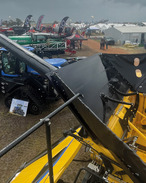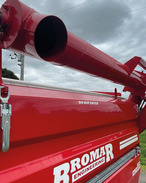Stuart McLaverty BASF Portfolio Manager Broadacre Australia and New Zealand claims the new registration for Sharpen will give farmers a 90 per cent reduction in wild radish seed-sets in cereals.
“This is a great outcome for the industry with the registration completed in time for the season,” Mr McLaverty said.
“The effective mode of action of Sharpen means that we’re now able to provide farmers with an earlier application window prior to harvest than any of the current options registered for this use,” he said.
Gavin Heard, Head of Development & Regulatory Affairs, Crop Protection Australia and New Zealand said BASF had been trailing the new use pattern across key areas of Australia, observing positive results in Western Australia where wild radish has been a persistent issue in late season cereal crops.
According to BASF, Sharpen is the only herbicide registered for this use pattern that can be applied as early as crop growth stage 71 - early milky dough. It’s early enough to burn off most wild radish flowers, but late enough to sterilise up to 90% of seed in green pods.
“We know how important it is to understand the pain points of our customers and create solutions for specific problems we continue to see out in fields – Sharpen now solves this issue in the late cycle of growth of barley, triticale and wheat,” Heard said.
The new registration further extends the use of Sharpen through the season, which is also registered for use as a harvest aid in pulse crops, pre-fallow broadleaf weed knockdown and fallow maintenance, pre-sowing knockdown of key broadleaf weeds and in-crop broadleaf weed control in established Lucerne.
Sharpen is a fast-acting Group G herbicide and is registered for reduction of wild radish seed set and viability of weed seeds in wheat, barley and triticale from the early milky dough crop stage.
























